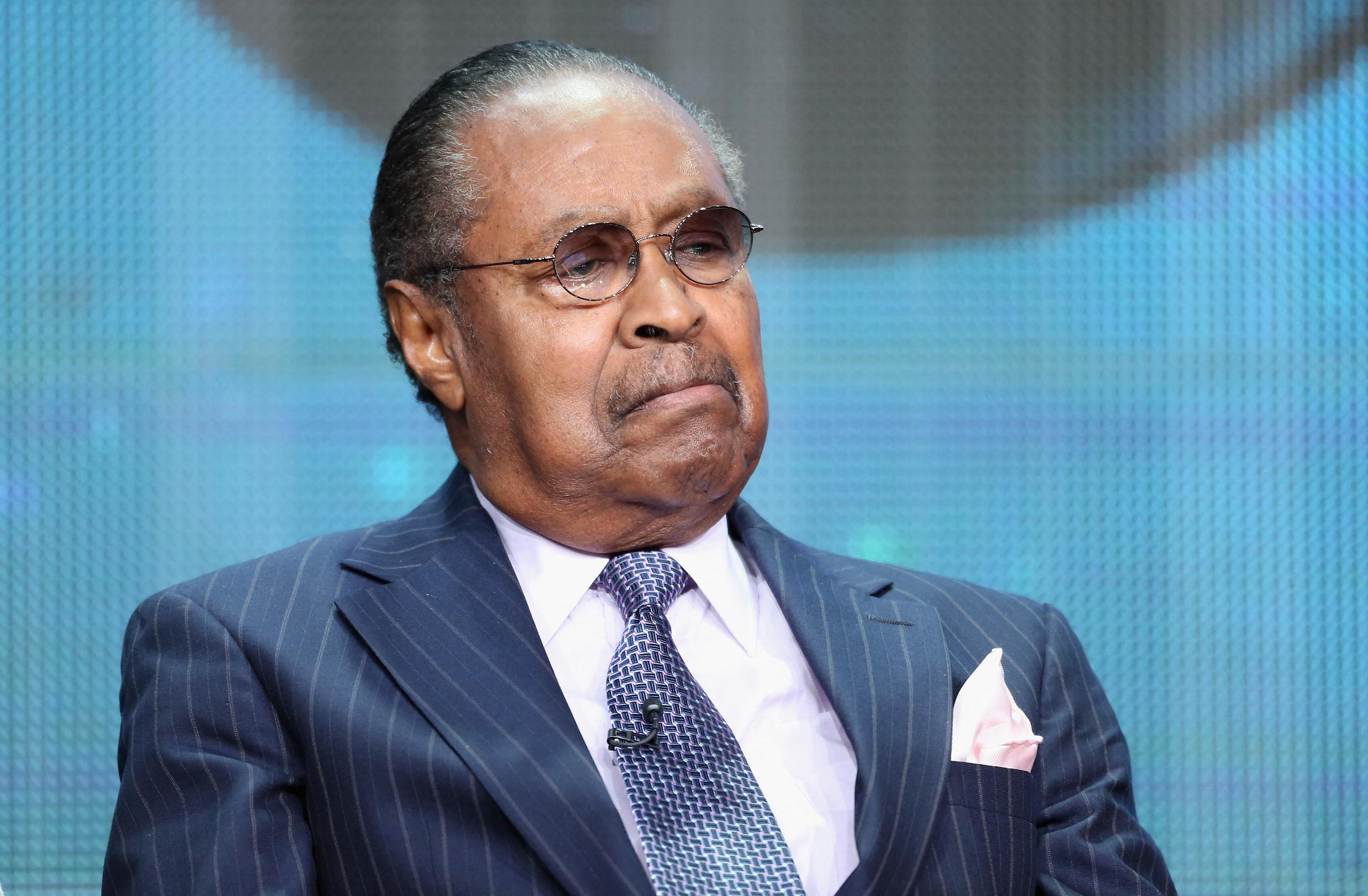Broadcast at halftime of the Super Bowl LVIII final, Sunday February 11, a clip against anti-Semitism placed Clarence Benjamin Jones, author of part of the famous “I have a dream” speech, in the spotlight. , declaimed by Martin Luther King during the March on Washington in 1963. The former lawyer, activist committed to equal civil rights, is as such an icon in the United States.
Robert Kraft, owner of the New England Patriots team, created the Foundation for Combating Anti-Semitism (FCAS) which released the clip. The billionaire himself paid the 7 million euros that 30 seconds of advertising time cost during half-time of one of the most watched sporting events in the world. This spot, which is part of the “
As the war between Israel and Hamas continues to divide the American population, Clarence Benjamin Jones works to re-cement the nation. “African Americans have an obligation not to remain silent in the face of blatant anti-Semitism, and Jews have an obligation not to remain silent in the face of blatant racism against African Americans,” he urges. -he in the columns of the Jewish News of Northern California. And continues: “Silence in the presence of hatred makes you complicit in that hatred.”
The author of seven paragraphs of “I have a dream” also summons his memories of struggle to illuminate the present. He particularly remembers a demonstration with Martin Luther King for civil rights in which many white people participated. Clarence Benjamin Jones questions them: “Why are you here to protest?” And to hear 90% of the white people present respond: “I am here with you because my grandparents died in a holocaust. "That's what they would like me to do, so I'm here to honor their memory." He then told this story to Martin Luther King, who became aware of the universality of his cause. It resonates particularly among Americans of Jewish faith. The pastor will also develop an extraordinary relationship with Rabbi Abraham Joshua Heschel. Looking back, Clarence Benjamin Jones believes they could never have successfully passed the Civil Rights Act of 1964 or even the Voting Rights Act of 1965 without the support of the Jewish community.
Also read: 60 years of “I have a dream”: “Martin Luther King would not be a statue remover”
60 years after Martin Luther King's "dream", Robert Kraft and Clarence Benjamin Jones are determined to take up the torch: "What we are going to do after this ad is build bridges to obtain more love, to master the hatred that exists and allow people from all walks of life, of all colors, of all sexes, of all religions, to look at the positive things in life.

 B:SM will break its investment record this year with 62 million euros
B:SM will break its investment record this year with 62 million euros War in Ukraine: when kyiv attacks Russia with inflatable balloons loaded with explosives
War in Ukraine: when kyiv attacks Russia with inflatable balloons loaded with explosives United States: divided on the question of presidential immunity, the Supreme Court offers respite to Trump
United States: divided on the question of presidential immunity, the Supreme Court offers respite to Trump Maurizio Molinari: “the Scurati affair, a European injury”
Maurizio Molinari: “the Scurati affair, a European injury” Irritable bowel syndrome: the effectiveness of low-carbohydrate diets is confirmed
Irritable bowel syndrome: the effectiveness of low-carbohydrate diets is confirmed Beware of the three main sources of poisoning in children
Beware of the three main sources of poisoning in children First three cases of “native” cholera confirmed in Mayotte
First three cases of “native” cholera confirmed in Mayotte Meningitis: compulsory vaccination for babies will be extended in 2025
Meningitis: compulsory vaccination for babies will be extended in 2025 When traveling abroad, money is a source of stress for seven out of ten French people
When traveling abroad, money is a source of stress for seven out of ten French people Elon Musk arrives in China to negotiate data transfer and deployment of Tesla autopilot
Elon Musk arrives in China to negotiate data transfer and deployment of Tesla autopilot Patrick Pouyanné, CEO of TotalEnergies, is very reserved about the rapid growth of green hydrogen
Patrick Pouyanné, CEO of TotalEnergies, is very reserved about the rapid growth of green hydrogen In the United States, a Boeing 767 loses its emergency slide shortly after takeoff
In the United States, a Boeing 767 loses its emergency slide shortly after takeoff A charred papyrus from Herculaneum reveals its secrets about Plato
A charred papyrus from Herculaneum reveals its secrets about Plato The watch of the richest passenger on the Titanic sold for 1.175 million pounds at auction
The watch of the richest passenger on the Titanic sold for 1.175 million pounds at auction Youn Sun Nah: jazz with nuance and delicacy
Youn Sun Nah: jazz with nuance and delicacy Paris Globe, a new international theater festival
Paris Globe, a new international theater festival Skoda Kodiaq 2024: a 'beast' plug-in hybrid SUV
Skoda Kodiaq 2024: a 'beast' plug-in hybrid SUV Tesla launches a new Model Y with 600 km of autonomy at a "more accessible price"
Tesla launches a new Model Y with 600 km of autonomy at a "more accessible price" The 10 best-selling cars in March 2024 in Spain: sales fall due to Easter
The 10 best-selling cars in March 2024 in Spain: sales fall due to Easter A private jet company buys more than 100 flying cars
A private jet company buys more than 100 flying cars This is how housing prices have changed in Spain in the last decade
This is how housing prices have changed in Spain in the last decade The home mortgage firm drops 10% in January and interest soars to 3.46%
The home mortgage firm drops 10% in January and interest soars to 3.46% The jewel of the Rocío de Nagüeles urbanization: a dream villa in Marbella
The jewel of the Rocío de Nagüeles urbanization: a dream villa in Marbella Rental prices grow by 7.3% in February: where does it go up and where does it go down?
Rental prices grow by 7.3% in February: where does it go up and where does it go down? Even on a mission for NATO, the Charles-de-Gaulle remains under French control, Lecornu responds to Mélenchon
Even on a mission for NATO, the Charles-de-Gaulle remains under French control, Lecornu responds to Mélenchon “Deadly Europe”, “economic decline”, immigration… What to remember from Emmanuel Macron’s speech at the Sorbonne
“Deadly Europe”, “economic decline”, immigration… What to remember from Emmanuel Macron’s speech at the Sorbonne Sale of Biogaran: The Republicans write to Emmanuel Macron
Sale of Biogaran: The Republicans write to Emmanuel Macron Europeans: “All those who claim that we don’t need Europe are liars”, criticizes Bayrou
Europeans: “All those who claim that we don’t need Europe are liars”, criticizes Bayrou These French cities that will boycott the World Cup in Qatar
These French cities that will boycott the World Cup in Qatar MLS: new double for Messi who offers victory to Miami
MLS: new double for Messi who offers victory to Miami PSG-Le Havre: Ramos on his way, Kolo Muani at the bottom of the hole… Favorites and scratches
PSG-Le Havre: Ramos on his way, Kolo Muani at the bottom of the hole… Favorites and scratches Football: Vasco da Gama separates from its Argentinian coach Ramon Diaz
Football: Vasco da Gama separates from its Argentinian coach Ramon Diaz F1: for the French, Ayrton Senna is the 2nd best driver in history ahead of Prost
F1: for the French, Ayrton Senna is the 2nd best driver in history ahead of Prost

















